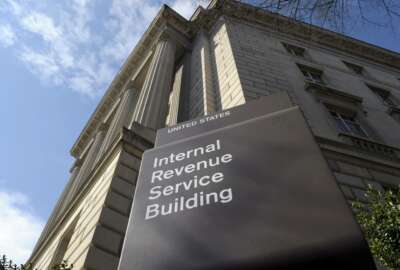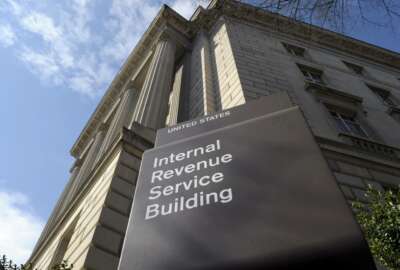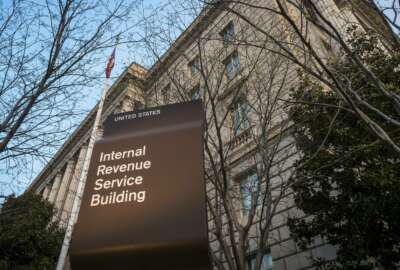One economist says the IRS really does need more enforcement horsepower
William Gale is an economist, tax expert and senior fellow at the Brookings Institution and he joined Federal Drive with Tom Temin for more discussion.
Best listening experience is on Chrome, Firefox or Safari. Subscribe to Federal Drive’s daily audio interviews on Apple Podcasts or PodcastOne.
Maybe we can’t quite do the math. But somehow everyone realizes that runaway government deficits will somehow hurt the American dream. That’s one reason, according to my next guest, that the IRS should get more money for enforcement tools and people. William Gale is an economist, tax expert and senior fellow at the Brookings Institution and he joined Federal Drive with Tom Temin for more discussion.
Interview transcript:
Tom Temin: Mr. Gale, good to have you on.
William Gale: Thank you happy to be here.
Tom Temin: And if increased enforcement will yield more revenue, as the president is proposing, and as others have proposed before him, I guess my first question is, could we also before that, simplify the tax code and maybe cut in some of the spending?
William Gale: Well, there are solvable problems, and there are unsolvable ones, I think simplifying the tax code is virtually unsolvable. I’ve written about that a fair amount. It’s very clear how we do it. But it’s equally clear that nobody has any actual interest in doing that. And that’s a topic unto itself. When I say nobody, I mean, nobody on the Hill. In the meantime, there’s low hanging fruit involved with tax evasion. There’s hundreds of billions of dollars a year that are not being collected. And you know, if politics is the art of the possible, we should focus on the issues that we can solve with evasion at the top of that list right now.
Tom Temin: And so what sorts of resources do you feel that the IRS needs because besides having more people, they must have some means of knowing where the evasion is taking place in the first place.
William Gale: There’s really three issues: One is the IRS staffing in general and auditing staff in particular, which has been cut substantially in the last two decades. The second is computer technology, the IRS is using computer languages that belong in an museum. And third is we need increased audits, increased attention, increased information reporting to help the IRS detect situations where people are evading taxes.
Tom Temin: And of course, tax evasion is a crime unlike tax avoidance, which is everyone’s smart strategy. And could increased enforcement and looking for evasion by the IRS also be accompanied by maybe given the complexity of the tax code and how easy it is to make an honest mistake? Maybe less on the punitive side, if someone agrees, and everyone agrees that an error was made, which results in evasion, but may not have had the intent of evasion.
William Gale: That’s correct. There is the difference between avoidance which everybody does, and it’s perfectly legal, and evasion, which is a felony and which consists of deliberately not paying taxes that you owe or deliberately not reporting income that you have. So the IRS, if it has the capabilities to increase auditing, it will get some money through the audits and the increased attention. But most people think we’ll get even more money through increased voluntary compliance. What we call voluntary should it be in air quotes. But it’ll get people reporting income that they weren’t otherwise reporting and thus paying taxes on it. So there’s a lot of room to reduce the evasion rate,
Tom Temin: and what sort of tools or data sharing would be required because all of this stuff has – any income anyone gets really has some evidence and electronic trail to it, unless they’re paid in cash.
William Gale: Right. The main ingredient here is information reporting. If people think about their jobs, their employer withholds taxes on their wages, sends it to the government. At the end of the year, the employer sends a statement to the government and to the worker on how much taxes were withhold. And obviously, the evasion rate with withholding and third party reporting is extremely low. The evasion rate on wages is under 1%, according to the IRS. In contrast, there are many situations where there’s no withholding and there’s no third party reporting. And the most obvious situations here are like partnerships, or sole proprietorships or farms. In all those cases, the underreporting of income is enormous; in sole proprietorships and farms, it’s over half of the income does not get reported to the IRS. And that’s obviously a problem. Some of that can be honest mistakes. Some of that may well be convenient or actually illegal. So getting to the bottom of that seems very important. In contrast, there’s been a lot of focus the last couple of years on EITC recipients – low income subsidies, and that’s basically been a political ploy. The evasion rates there is not very big and when it is, it’s usually a situation of the wrong parent getting the deduction for the child, rather than somebody outright trying to cheat the tax system.
Tom Temin: We’re speaking with William Gale. He’s a senior fellow in Economic Studies and co-director of the Tax Policy Center at the Brookings Institution. And over the years as you pointed out, the IRS has had limited budgets. They’ve had budget cuts by both administrations and both parties in Congress, yet they haven’t had zero resources. And knowing then that say, in limited partnerships or farms and so forth, that the evasion rate is that high, what has stopped them from concentrating – they can find 100 people from somewhere to concentrate on those particular problems.
William Gale: In part has been limits on resources. Again, they’re auditing and staff has fallen in part. It’s hard for them to keep up with the latest state of the art evasion techniques in the private sector. In part, it’s just been kind of a public relations thing. They want to be careful not to go too far. I mean, let’s say they do, you know, 1,000 audits and 50 of them are not far enough, and 50 of them are too far, you’re gonna hear in the media about the 50 that are too far. So they’re very sensitive to not overstepping their bounds.
Tom Temin: And because you mentioned too there’s not a lot of political will or zero political will for simplifying the tax code. I recall, when George H.W. Bush was running against Michael Dukakis. And Dukakis proposed, the very thing that we’re hearing about now is increasing the IRS enforcement staff and so on. George H.W. Bush simply said, “Well, I’m not going to send a whole swarm of people to harass everybody in the United States.” So I wonder how much politically realistic it would be for the IRS to get these types of funds and resources that the president is proposing?
William Gale: Well, the bill that just came out of Ways and Means has a substantial increase in it for IRS fundin. It’s important that the increase not just be large, but it be sustained. Because you can’t build a new system, you can’t build a new computer system, you can’t train new people over time if you don’t have the sustained funding. Still, a one off is not going to be enough. And the fact that the bill discusses sustained funding is really important to its success.
Tom Temin: And sustained funding sometimes puts spending programs out of the apparent control of Congress or an administration and then that can raise constitutional issues, I suppose.
William Gale: Yeah Congress can always undo anything that Congress does. So this is similar to an investment, say an infrastructure – you don’t want to build half the bridge and then stop the funding. Likewise, you don’t want to pay for the IRS to install a new computer system and then hold back the funding that would let them learn how to use the new computer system.
Tom Temin: Alright, so getting back to some of the specifics, where do you see specifically what the IRS needs in terms of people, resources, money, and systems? Just to summarize it?
William Gale: The short answer is everything but the two things I would focus on is auditing staff and information. Well three things: Auditing staff, the information reporting from financial institutions so they can track financial flows better, and the computer technology.
Tom Temin: William Gale is senior fellow in Economic Studies and co-director of the Tax Policy Center at the Brookings Institution. Thanks so much for joining me.
William Gale: Thanks for having me and talking about these important issues.
Copyright © 2025 Federal News Network. All rights reserved. This website is not intended for users located within the European Economic Area.
Tom Temin is host of the Federal Drive and has been providing insight on federal technology and management issues for more than 30 years.
Follow @tteminWFED






